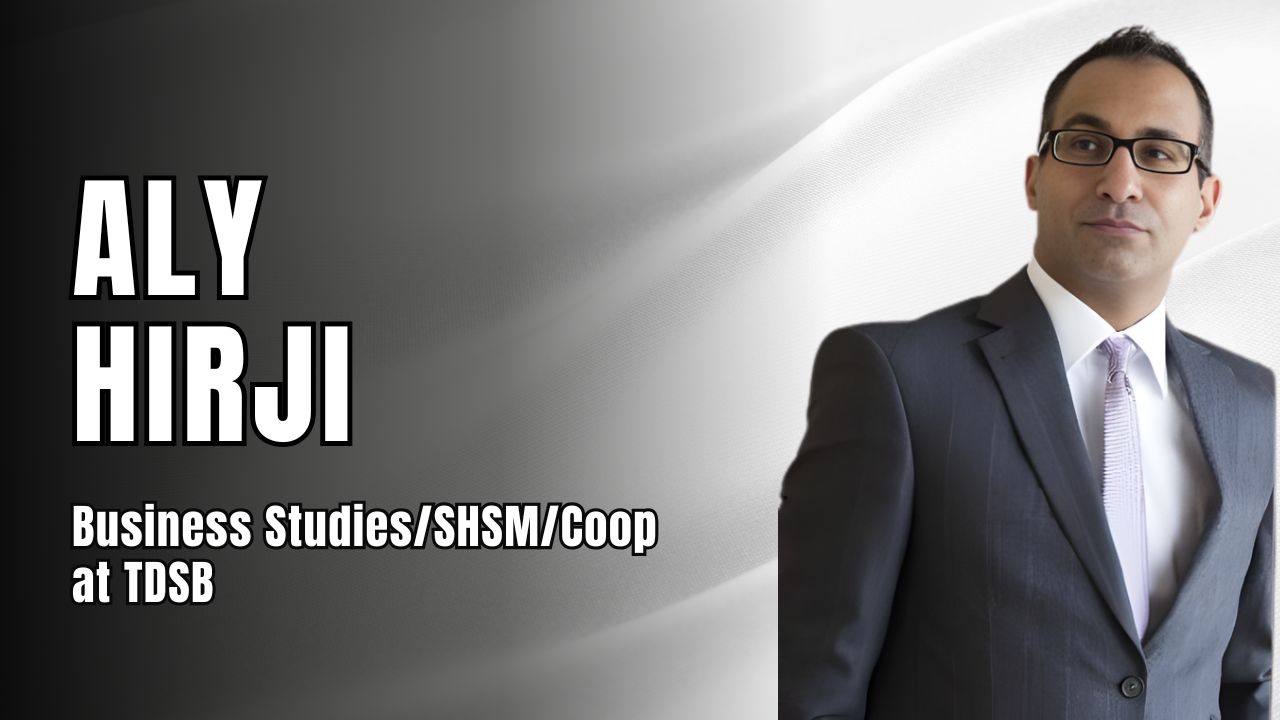Beyond the Textbook: How Aly Hirji is Preparing Students for the Real World
From marshmallow towers to AI ethics, TDSB educator Aly Hirji shares how he blends real-world skills with classroom learning to build the next generation of adaptable, responsible learners.
What if school was less about memorizing facts and more about preparing for life?
For Aly Hirji, SHSM Coordinator and Business Department Head at Agincourt Collegiate Institute, that question is not theoretical, it defines how he teaches. With over 14 years of experience, Aly has helped transform traditional education models by embedding real-world scenarios, teamwork simulations, and industry connections directly into the classroom. As a guest on The LearnIt Podcast, he offered deep insights into the evolving landscape of education and how educators can better prepare students for the challenges of today and tomorrow.
“I bring in guest speakers and run simulations, not because I can’t teach the material, but because students value hearing from people in the field,” Aly explained. “It shifts the energy in the classroom and gives them a new lens to see what’s possible.”
Teaching in the Age of AI and Uncertainty
Aly’s classroom philosophy is rooted in adaptability, a trait he learned the hard way. Originally enrolled in engineering, he pivoted to computer science, then finally found his path through a high school business course and volunteer teaching. That same openness to evolution now drives his approach to education.
In today’s post-pandemic world, teachers are navigating a wave of digital disruption, especially from artificial intelligence. Aly is clear-eyed about both the risks and the rewards.
“We’re at the point where AI is forcing both teachers and students to rethink learning,” he said. “The key is not banning it, but guiding students to use it responsibly, and making sure they understand that what they produce still has to be accurate, ethical, and their own.”
He sees AI tools not as shortcuts, but as potential springboards—if students learn to ask better questions, verify facts, and integrate what they find thoughtfully. But he’s also candid about the pressures AI places on educators, from managing academic integrity to updating assessments.
From Marshmallows to Mentorship: Making Learning Tangible
Aly’s classroom is far from traditional. Think spaghetti towers, lost-at-sea survival simulations, and impromptu budget challenges. These aren’t gimmicks—they’re strategic choices aimed at building what researchers call “transferable skills”: teamwork, problem-solving, communication, and adaptability.
“I teach content, yes,” he said, “but I also teach life. The goal is for students to say later, ‘I learned that in high school and I’m still using it.’”
He even invites alumni back to share their post-secondary and career journeys, creating powerful mentorship loops. It’s part of a broader trend in experiential learning, where field trips, co-ops, and real-world challenges build bridges between school and the workforce.
This aligns with a growing emphasis across Canada on skills-based education. According to a 2022 RBC report, “the coming skills revolution” will require schools to emphasize adaptability, collaboration, and critical thinking over rote memorization. Aly is already doing that one marshmallow tower at a time.

Aly Hirji on The LearnIt Podcast
Equity, Engagement, and the Power of Small Gestures
While the big ideas are important, Aly believes small acts can transform a classroom. Learning every student’s name. Greeting them at the door. Creating a space where students feel seen and heard.
“The ideal student?” he mused. “It’s all of them. My job is to help them realize their own potential.”
He also acknowledges the need for greater investment in professional development, particularly around new technologies. Workshops on AI, resources to support classroom innovation, and access to industry partnerships aren’t just luxuries, they’re necessities for future-ready schools.
The Future of Teaching: Respect, Relevance, and Rebuilding
Teacher shortages, especially in Ontario, remain a pressing concern. Aly connects this trend to the demanding nature of the job, extended teacher education programs, and limited financial incentives.
“We need to make teaching exciting again,” he said. “Let people shadow a teacher for a day. Let them see the impact. If we can remove some of the red tape and boost support, we’ll attract the passionate educators we need.”
His message to fellow teachers is simple but powerful:
“Don’t give up on a child. And don’t be afraid to try new things. Students notice when you try - for them, and they respect it.”
Final Thoughts
Aly Hirji’s story is a masterclass in modern teaching: part mentor, part innovator, part real-world guide. His work exemplifies what education can be when we treat it not as a system, but as a relationship between teachers, students, industry, and the future.
In a world where the only constant is change, it’s educators like Aly who remind us that the best learning doesn’t just happen in a textbook. It happens in life.


